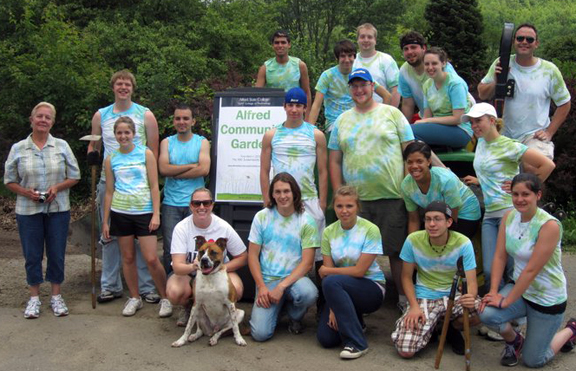
Only three new projects in the State of New York earned a coveted AmeriCorps VISTA grant for Nov. 2013 to Nov. 2014. And Alfred State, with its focus on nutritional literacy and community-based gardening in collaboration with Literacy West NY, Inc. and Alfred Community Garden, was one of the fortunate recipients.
“Over a quarter of Allegany County adults do not eat the recommended servings of fruits and vegetables per day” says Jonathan Hilsher, director of civic engagement at Alfred State. “This is just one example of local nutritional challenges, which are compounded by the food security issues that come with living in a county with one of the highest levels of poverty in New York.”
Although the data looks grim, members of Alfred State, Literacy West NY, and the Alfred Community Garden believe that an integrated, community-based gardening and nutritional literacy campaign will help to address the interrelated challenges of poverty, food insecurity, and nutritional deficiency in the area. The VISTA project will leverage the power of community-based gardening and collaborative programming to promote both awareness of and access to nutritional, local, and affordable produce for low-income individuals and families. “This will require partnerships with key members of the community—school districts, health care facilities, and food pantries to name a few.”
Sally Murphy, an AmeriCorp VISTA member, will oversee this project. She is the first to serve at Alfred State, and her presence will enhance the ability of the college community to engage the issue of nutritional literacy while also addressing community challenges.
Coordinators of the program have a fairly simple goal—increase food security and nutritional literacy among individuals and families in Allegany County. But the execution will be startlingly complex, with a multitude of constituencies and stakeholders. Through research, collaboration, mobilization of volunteers, programming, and organizing promotional events to raise awareness, VISTA and its community partners hope to inspire others to act and build the capacity for this work to continue. “We want to mobilize the campus community,” Hilsher says. “And build on the strengths of our partners and the assets already present in our community to address food security and nutritional deficiencies. We want this initiative to eventually serve as a living laboratory for delivering educational opportunities while acting as a model for other communities.”

